Articles
- Page Path
- HOME > J Korean Acad Nurs > Volume 41(3); 2011 > Article
-
Original Article
- Educational Needs for Consideration in Developing Curriculum for Staff in Charge of Public Health Services in Public Hospitals
- Eun Jeong Hwang
-
Journal of Korean Academy of Nursing 2011;41(3):393-402.
DOI: https://doi.org/10.4040/jkan.2011.41.3.393
Published online: June 13, 2011
Senior Researcher, National Medical Center, Public Health Policy Development Team, Seoul, Korea.
- Address reprint requests to: Hwang, Eun Jeong. National Medical Center, Public Health Policy Development Team, 243 Eulji-ro, Jung-gu, Seoul 100-799, Korea. Tel: +82-2-2260-7246, Fax: +82-2262-4740, eejhhh@naver.com
• Received: September 27, 2010 • Accepted: June 7, 2011
© 2011 Korean Society of Nursing Science
Abstract
-
Purpose
- This study was done to assess the educational needs that should be considered in developing curriculum for staff in charge of public health services in public hospitals.
-
Methods
- The participants in this study were staff in charge of public health services in 130 public hospitals. The Borich's Needs Assessment Model which analyzed the relation of 'required competence level' and 'present competence level', was utilized. Data were collected from October to November 2007 using a structure self-report questionnaire. The return rate was 66.9%. The Cronbach's alpha score was 0.959.
-
Results
- The mean scores for 'required competence level', 'present competence level' and Borich's need were 4.02, 3.44, and 2.30 respectively. According to public health service items, 'strategies to recognize the present condition and analyze problems' had the highest score for Borich's need, but 'establishment of annual or monthly objectives' had the lowest score for Borich's need.
-
Conclusion
- Education was found to be very important for staff carrying out public health services. Ultimately the results of this study may be utilized to develop education program for staff carrying out public health services in public hospitals.
- 1. Altschuld JW, Talylor WD, Canelos J. Classifying needs assessment strategies for teaching purposes. Paper presented at the annual meeting of the Evaluation Research Society. 1982, October; Baltimore, Maryland.
- 2. Bae SS. Public health plan. 2004;Seoul, Kaechukmunhwa-Sa.
- 3. Baeg JH. Needs assessment of elementary school children for technological literacy contents. 2003;Incheon, Gyeongin National University of Education. Unpublished master's thesis.
- 4. Borich GD. A needs assessment model for conducting follow-up studies. Journal of Teacher Education. 1980;31:39–42.ArticlePDF
- 5. Cho DY. Exploring how to set priority in need analysis with survey. Journal of Research in Education. 2009;35:165–187.
- 6. Jung JH. The educational needs analysis and design education in practical arts, practical arts curriculum. Journal of Korean Practical Arts Education. 2008;21:223–240.
- 7. Kaufman RA. Educational system planning. 1972;Englewood Cliffs, NJ, Prentice-Hall, Inc.
- 8. Kim JS, Choi YH, Kim SK. Analysis of in-service status and educational needs of engineering faculties. Journal of Engineering Education Research. 2008;11:50–64.Article
- 9. Kim TS, Park YH, Yun TY, Han DU. Relationship between employees' job satisfaction, education demand and intention to leave in health care sector. Paper presented at the meeting of the Korean Society of Health Policy and Administration on Public Health Budgets and Tasks. 2004, November; Seoul.
- 10. Kim YI, Jung JH, Lee CS, Choi MS. Educational needs analysis of elementary teachers for technological literacy. Journal of Korean Practical Arts Education. 2001;14:93–107.
- 11. Kim YL, Kim SW, Chung EK, Choi JS. Education need of the visiting health service workers in Gwangju and Jeollanam-do public health facilities. Korean Journal of Rural Medicine. 2002;27:51–64.
- 12. Kister J, Gritzmacher J. Laster JF, Dohner RE. Curriculum research alternatives. In: Vocational home economics curriculum: State of the field. 1986;Illinois, Bennett & McKnight. 136–145.
- 13. Korea Health Industry Development Institute. Methods to develop the functions of public health. 2001;11;Seoul, Author.
- 14. Korea Health Industry Development Institute. A study on the public healthcare plan and evaluation for enhancing public interest in public hospitals. 2006;04;Seoul, Author.
- 15. Korea Health Industry Development Institute. The development of the education program for the public health service workforce in public hospitals. 2007;11;Seoul, Author.
- 16. Lee JG. Educational needs of elementary school preliminary tea-chers about education contents of 2007 revised practical arts curriculum. Journal of Korean Practical Arts Education. 2009;22:37–56.
- 17. Ministry of Health & Welfare. 2nd public health services plan (2006-2010) guideline. 2005;12;Seoul, Author.
- 18. Ministry of Health & Welfare. Evaluation of 2006 public health plan & results. 2007;07;Seoul, Author.
- 19. Ministry of Health & Welfare. Evaluation of 2008 public health plan & results. 2009;05;Seoul, Author.
- 20. Park JH. Strategies for public health service development in the times of local autonomy. Korean Journal of Health Policy and Administration. 2002;12:1–22.Article
- 21. Park NR, Jeong IS, Lee JG, Kim YT, Chun JH, Kim KS, et al. Evaluation of field epidemiology specialist training program based on the satisfaction and the changes of educational needs. Korean Journal of Preventive Medicine. 2004;37:80–87.
- 22. Ministry of government legislation. Public Health Act. 2010;Retrieved January 18, 2010. form http://www.law.go.kr/main.html.
- 23. Strohschein J, Hagler P, May L. Assessing the need for change in clinical education practices. Physical Therapy. 2002;82:160–172.ArticlePubMedPDF
REFERENCES
Table 2Required Competence Level (RCL), Present Competence Level (PCL) and Educational Needs (Need) Related to Public Health Services
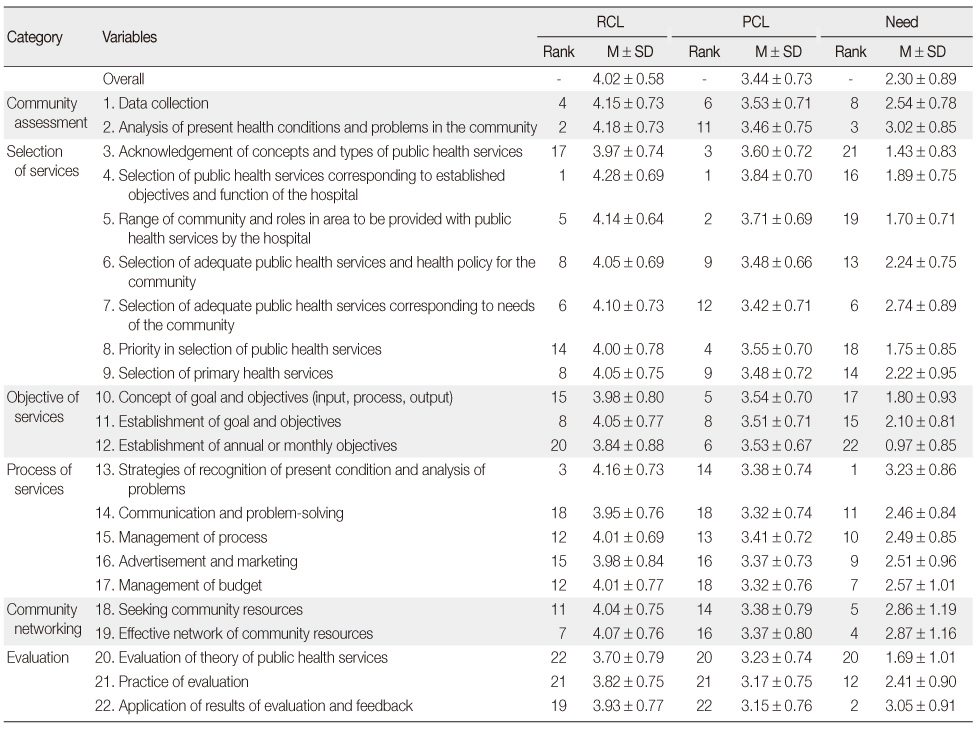

Table 3Required Competence Level (RCL), Present Competence Level (PCL) and Educational Needs (Need) Related to Public Health Services according to Discipline
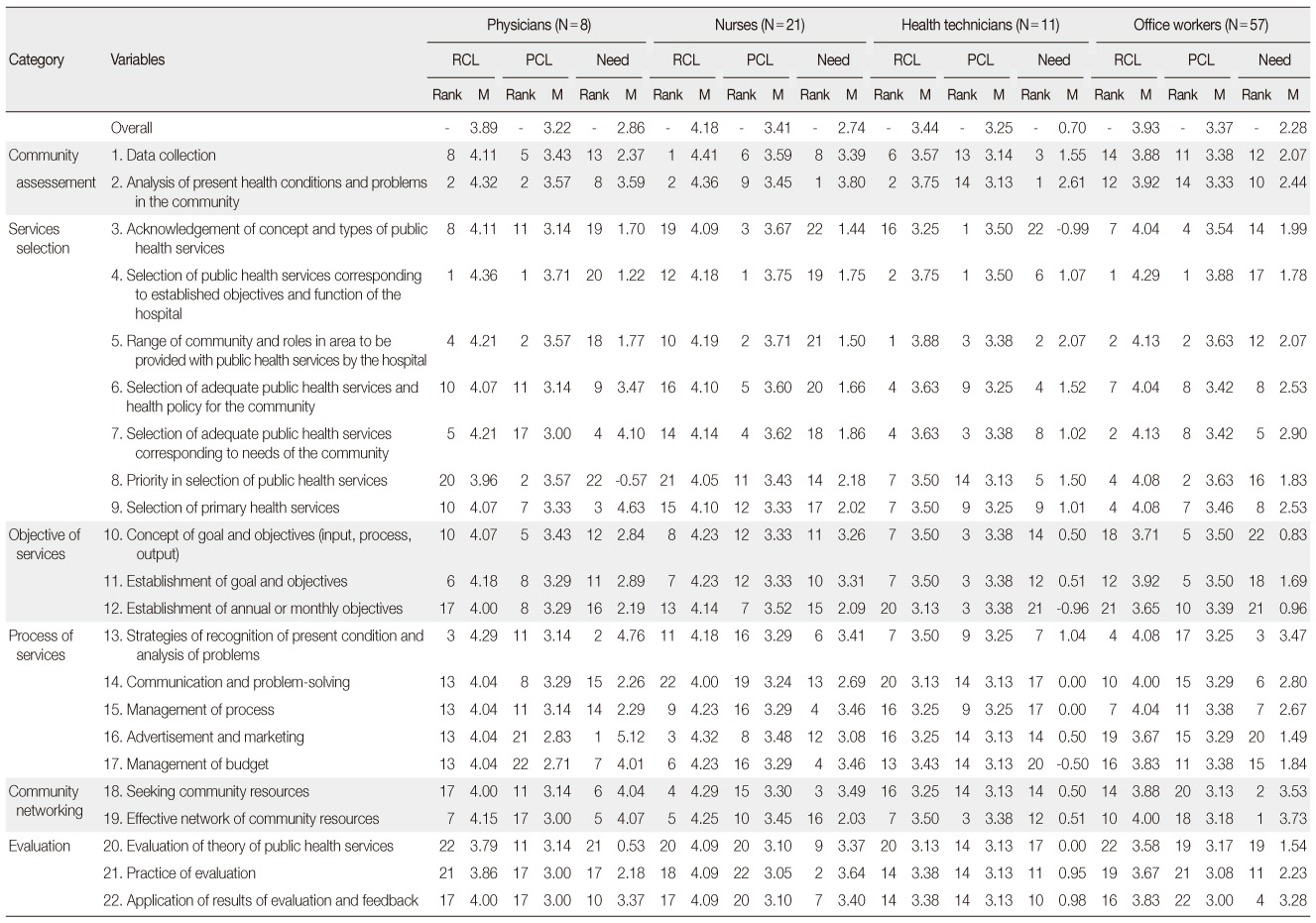

Figure & Data
REFERENCES
Citations
Citations to this article as recorded by 

- Feasibility of a nurse-led online video intervention for mealtime assistance in dementia care: a quasi-experimental mixed-methods study
Dukyoo Jung, Leeho Yoo, Soogyung Shin, Sukyung Byeon, Hyein Seo, Eunju Choi
BMC Geriatrics.2025;[Epub] CrossRef - Analyzing the Relative Importance for the Development Plan of the Public Health Care System
You Ho Kim
Journal of Health Informatics and Statistics.2018; 43(4): 300. CrossRef - An Effective Model for Improving Global Health Nursing Competence
Sun-Joo Kang
Frontiers in Public Health.2016;[Epub] CrossRef - A Survey of Role Perception and Function Performance Related to Public Health Service among the Medical Staff in a National Hospital
Young-Hye Cho, Sang-Yeoup Lee, Dong-Wook Jeong, Eun-Jung Choi, Yun-Jin Kim, Jeong-Gyu Lee, Yu-Young Go, Yu-Hyone Lee, Mi-Jin Bae, Chang-Hoon Kim
Journal of agricultural medicine and community health.2012; 37(2): 67. CrossRef
Educational Needs for Consideration in Developing Curriculum for Staff in Charge of Public Health Services in Public Hospitals
Educational Needs for Consideration in Developing Curriculum for Staff in Charge of Public Health Services in Public Hospitals
Characteristics of Study Respondents
Required Competence Level (RCL), Present Competence Level (PCL) and Educational Needs (Need) Related to Public Health Services
Required Competence Level (RCL), Present Competence Level (PCL) and Educational Needs (Need) Related to Public Health Services according to Discipline
Required Competence Level (RCL), Present Competence Level (PCL) and Educational Needs (Need) of This Study Related to Public Health Services according to Position
Differences in Educational Needs by Disciplines and Position
Table 1
Characteristics of Study Respondents
Table 2
Required Competence Level (RCL), Present Competence Level (PCL) and Educational Needs (Need) Related to Public Health Services
Table 3
Required Competence Level (RCL), Present Competence Level (PCL) and Educational Needs (Need) Related to Public Health Services according to Discipline
Table 4
Required Competence Level (RCL), Present Competence Level (PCL) and Educational Needs (Need) of This Study Related to Public Health Services according to Position
Table 5
Differences in Educational Needs by Disciplines and Position
 KSNS
KSNS
 E-SUBMISSION
E-SUBMISSION
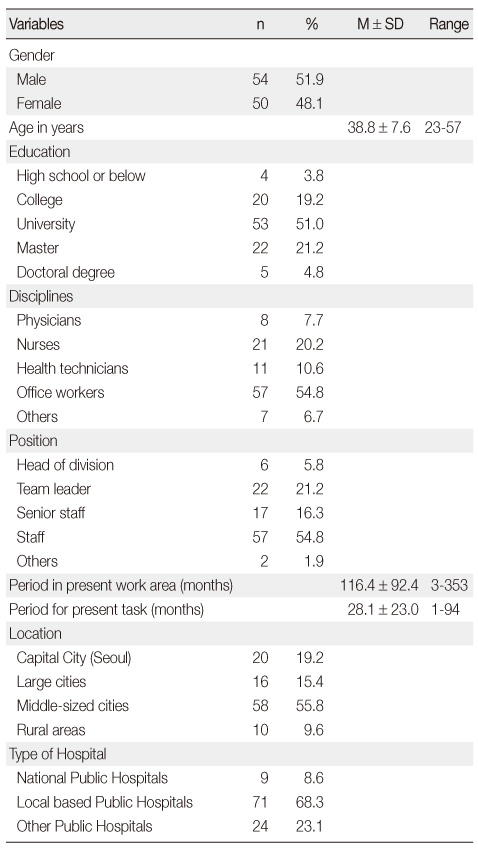
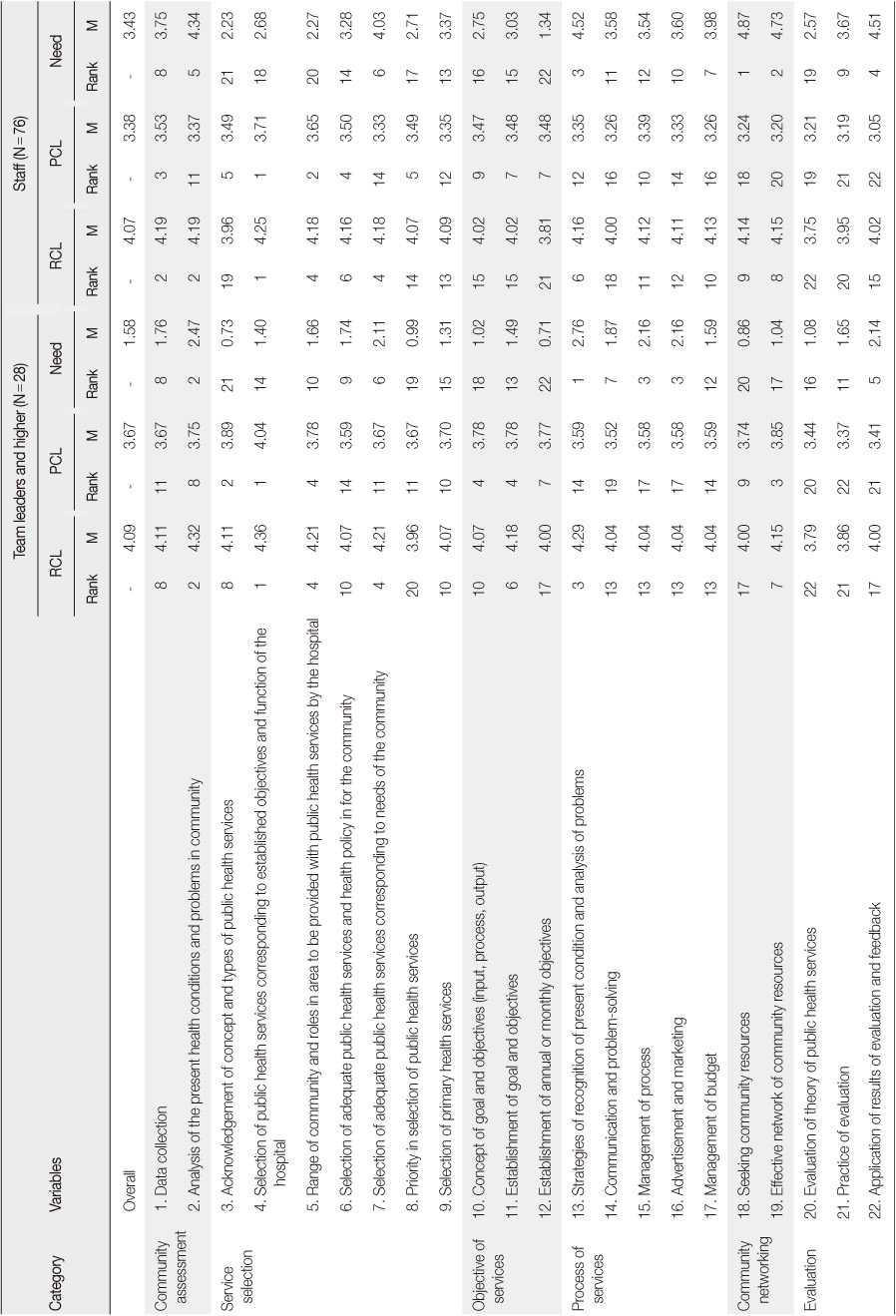
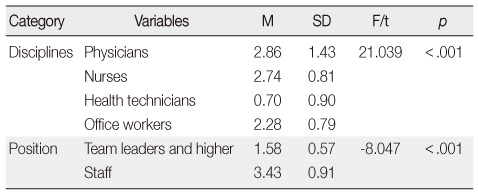
 Cite
Cite

